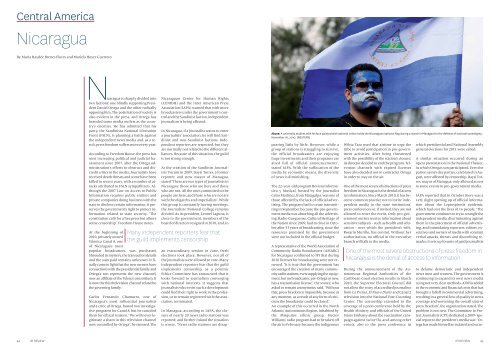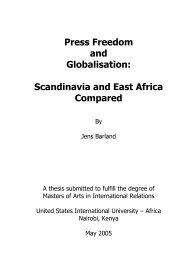FOCUS ON THE AMERICAS - International Press Institute
FOCUS ON THE AMERICAS - International Press Institute
FOCUS ON THE AMERICAS - International Press Institute
You also want an ePaper? Increase the reach of your titles
YUMPU automatically turns print PDFs into web optimized ePapers that Google loves.
Central America<br />
Nicaragua<br />
By María Haydée Brenes Flores and Mariela Hoyer Guerrero<br />
Nicaragua is sharply divided into<br />
two factions: one blindly supporting President<br />
Daniel Ortega and the other radically<br />
opposing him. The polarization of society is<br />
also evident in the press, and Ortega has<br />
branded some media outlets as the country’s<br />
enemies. He has admitted that his<br />
party, the Sandinista National Liberation<br />
Front (FSLN), is planning a battle against<br />
the independent news media and, as a result,<br />
press freedom suffers more every year.<br />
According to Freedom House, the press has<br />
seen increasing political and judicial harassment<br />
since 2007, after the Ortega administration’s<br />
efforts to obstruct and discredit<br />
critics in the media. Journalists have<br />
received death threats and some have been<br />
killed in recent years, with a number of attacks<br />
attributed to FSLN sympathizers. Although<br />
the 2007 Law on Access to Public<br />
Information requires public entities and<br />
private companies doing business with the<br />
state to disclose certain information, it preserves<br />
the government’s right to protect information<br />
related to state security. “The<br />
constitution calls for a free press but allows<br />
some censorship”, Freedom House notes.<br />
At the beginning of<br />
2010, privately owned<br />
Telenica Canal 8, one<br />
of Nicaragua’s most<br />
popular broadcasters, was purchased.<br />
Shrouded in mystery, the transaction details<br />
and the sum paid remains unknown. It finally<br />
came to light that the new owners have<br />
connections with the presidential family and<br />
Ortega’s son represents the new channel,<br />
now an affiliate of the Telesur consortium. It<br />
is now the third television channel related to<br />
the governing family.<br />
Carlos Fernando Chamorro, one of<br />
Nicaragua’s most influential journalists<br />
and a critic of Ortega, hosted two investigative<br />
programs for Canal 8, but he canceled<br />
them for ethical reasons. “We will never legitimate<br />
a sham in this television channel<br />
now controlled by Ortega”, he stressed. The<br />
Nicaraguan Center for Human Rights<br />
(CENIDH) and the Inter American <strong>Press</strong><br />
Association (IAPA) warned that with more<br />
broadcasters under the government’s control<br />
and the Sandinist faction, independent<br />
journalism is being affected.<br />
In Nicaragua, if a journalist wants to enter<br />
a journalists’ association, he will find Sandinist<br />
and non-Sandinist factions. Independent<br />
reporters are respected, but they<br />
are normally not related to the different alliances.<br />
Because of this situation, the guild<br />
is not strong enough.<br />
At the creation of the Sandinist Journalists’<br />
Forum in 2009, Daysi Torres, a former<br />
reporter and now mayor of Managua,<br />
stated “There are two types of journalists in<br />
Nicaragua: those who are here and those<br />
who are not. All the ones committed to the<br />
people are here, and those who are not are<br />
with the oligarchs and imperialists”. While<br />
this group is constantly having meetings,<br />
the Journalists’ National College remains<br />
divided. As its president, Leonel Laguna, is<br />
close to the government, members of the<br />
board of directors resigned in 2010, and, in<br />
Many independent reporters fear that<br />
the guild implements censorship<br />
an extraordinary session in June, fresh<br />
elections took place. However, not all of<br />
the journalists were allowed to vote. Many<br />
independent reporters fear that the guild<br />
implements censorship, as a polemic<br />
Ethics Committee has announced that it<br />
looks forward to journalism converging<br />
with national interests. It suggests that<br />
journalists who resist such a development<br />
could find their right to work in the profession,<br />
or to remain registered with the association,<br />
terminated.<br />
In Managua, according to IAPA, the closure<br />
of nearly 20 news radio stations was<br />
reported; and further inland the situation<br />
is worse. “News radio stations are disap-<br />
Above: A university student with his face painted with national colors holds the Nicaraguan national flag during a march in Managua for the defense of national sovereignty,<br />
November 16, 2010. (REUTERS)<br />
pearing little by little. However, while a<br />
group of stations is struggling to survive,<br />
the official broadcasters are enjoying<br />
huge investments and their programs are<br />
aired full of official announcements”,<br />
stated IAPA. With the suffocation of the<br />
media by economic means, the diversity<br />
of news is diminishing.<br />
The 22-year-old program Revista Informativa<br />
y Musical, hosted by the journalist<br />
Celso Martínez, from Matagalpa, was one of<br />
those affected by the lack of official advertising.<br />
The program had to cease transmitting<br />
in September because the pro-government<br />
media was absorbing all the advertising.<br />
Radio Gueguense, Cultural Heritage of<br />
the Nation since 2009, had to close in October<br />
after 53 years of broadcasting, since the<br />
resources promised by the government<br />
were not included in the official budget.<br />
A representative of the World Association of<br />
Community Radio Broadcasters (AMARC)<br />
for Nicaragua confirmed to IPI that during<br />
2010 licenses for broadcasting were not renewed.<br />
“It is true that the government has<br />
encouraged the creation of many community<br />
radio stations, even supplying the equipment,<br />
but no broadcaster, pre-Ortega or new,<br />
has a transmission license,” the source, who<br />
asked to remain anonymous, said. “Without<br />
that, press freedom is impossible, because at<br />
any moment, as a result of any form of criticism,<br />
the broadcaster could be closed.”<br />
An example of this occurred in the North<br />
Atlantic Autonomous Region, inhabited by<br />
the Misquitos ethnic group. Hector<br />
Williams’ radio program had to be taken off<br />
the air in February because the indigenous<br />
Wihta Tara used that airtime to urge the<br />
tribe to avoid participation in pro-government<br />
activities. After being threatened<br />
with the possibility of the station’s closure,<br />
its director decided to end the program. Television<br />
channels with expired licenses<br />
have also decided not to contradict Ortega<br />
in order to stay on the air.<br />
One of the most severe obstructions of press<br />
freedom in Nicaragua is the denial of access<br />
to information. Since March 2010, it has become<br />
common practice not to invite independent<br />
media to the state institutions’<br />
press conferences or, if invited, they are not<br />
allowed to enter the event. Only pro-government<br />
outlets receive information about<br />
sensitive subjects - such as health and education<br />
- over which the president’s wife,<br />
Rosario Murillo, has control. Without her<br />
authorization, no official in the executive<br />
branch will talk to the media.<br />
During the announcement of the Autonomous<br />
Regional Authorities of the<br />
Caribbean Coast election results in March<br />
2010, the Supreme Electoral Council did<br />
not allow the entry of accredited journalists<br />
from La Prensa, El Nuevo Diario and Canal 2<br />
television into the National Vote-Counting<br />
Center. The censorship extended to the<br />
coverage of a press conference held by the<br />
Health Ministry and officials of the United<br />
States Embassy about the vaccination campaign<br />
against swine flu, and, among other<br />
events, also to the press conference in<br />
which presidential and National Assembly<br />
general elections for 2011 were called.<br />
A similar situation occurred during an<br />
opera presentation in the National Theater,<br />
in which Ortega’s son participated. Even the<br />
patron saint’s day parties, celebrated in August,<br />
were affected by censorship. Daysi Torres,<br />
mayor of Managua, only allowed access<br />
to some events to pro-government media.<br />
IAPA reported that in October there was a<br />
very slight opening up of official information<br />
about the Leptospirosis epidemic,<br />
which had cost the lives of 16 people. “The<br />
government continues to try to strangle the<br />
independent media, discriminating against<br />
them in the placement of official advertising,<br />
and intimidating reporters, editors, executives<br />
and owners of media with constant<br />
verbal attacks, threats and discrediting remarks;<br />
it sets up forums of paid journalists<br />
One of the most severe obstructions of press freedom in<br />
Nicaragua is the denial of access to information.<br />
to defame democratic and independent<br />
news men and women. The government is<br />
continuing to expand its own news media<br />
using not very clear methods. All this added<br />
to the economic and financial crisis that has<br />
brought a falloff in commercial advertising,<br />
resulting in a general loss of quality in news<br />
coverage and worsening the overall state of<br />
press freedom”, the organization stated. The<br />
problem is not new. The Committee to Protect<br />
Journalists (CPJ) dedicated a 2009- special<br />
report to the president’s media war. “Ortega<br />
has made himself an isolated and secre-<br />
44 IPI REVIEW<br />
IPI REVIEW 45

















